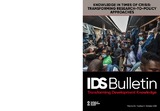| dc.contributor.author | Ordóñez Llanos, Andrea | |
| dc.contributor.author | Georgalakis, James | |
| dc.date.accessioned | 2023-10-19T07:40:13Z | |
| dc.date.available | 2023-10-19T07:40:13Z | |
| dc.date.issued | 2023-10-16 | |
| dc.identifier.citation | Ordóñez Llanos, A. and Georgalakis, J. (eds) (2023) ‘Knowledge in Times of Crisis: Transforming Research-to-Policy Approaches’, IDS Bulletin 54.2, DOI: 10.19088/1968-2023.126 | en |
| dc.identifier.uri | https://opendocs.ids.ac.uk/opendocs/handle/20.500.12413/18146 | |
| dc.description.abstract | The Covid-19 pandemic resulted in unprecedented challenges for researchers and policy analysts, and accentuated the need for access to civil society and advocacy movements within politically closed spaces. The impact of locally led Covid-19 response research in the global South has subsequently raised questions about traditional research methods that often prioritise academic rigour over practical relevance and result in research disconnected from the realities of people’s lives.
This issue of the IDS Bulletin presents learning gathered from rapidly mobilised Southern-led research by institutions who designed and delivered research aimed at influencing the response to the Covid-19 pandemic. The articles here are drawn from the Covid-19 Responses for Equity (CORE) programme, a rapid research initiative created to understand the socioeconomic impacts of the pandemic in order to generate better policy for recovery.
The IDS Bulletin explores the particular characteristics of Southern research organisations that were able to mobilise quickly. It discusses the types of knowledge that were needed in these unique circumstances, and how organisations mobilised knowledge in an emergency to facilitate engagement and influence response to a global challenge with local implications.
The examples here demonstrate how researchers have developed new skills to present research findings in accessible ways for different audiences. The explicit use of digital technologies, for instance, has allowed researchers to facilitate collaboration across geographic boundaries and engage diverse stakeholders.
This all highlights how essential locally led research is for pandemic response and for development more broadly. There is also acknowledgement that how organisations responded to the pandemic may have a longer-term impact on the future of those organisations themselves. | en |
| dc.description.sponsorship | IDRC | en |
| dc.language.iso | en | en |
| dc.publisher | Institute of Development Studies | en |
| dc.relation.ispartofseries | IDS Bulletin;54.2 | |
| dc.rights | This is an Open Access article distributed under the terms of the Creative Commons Attribution 4.0 International licence (CC BY), which permits unrestricted use, distribution, and reproduction in any medium, provided the original authors and source are credited and any modifcations or adaptations are indicated. | en |
| dc.rights.uri | https://www.ids.ac.uk/wp-content/uploads/2021/05/Latest_IDSOpenDocsStandardTermsOfUse_CC_BY.pdf | en |
| dc.subject | Health | en |
| dc.title | Knowledge in Times of Crisis: Transforming Research-to-Policy Approaches | en |
| dc.type | Article | en |
| dc.rights.holder | Institute of Development Studies (IDS) | en |
| dc.identifier.team | Imapct and Learning Team | en |
| dc.identifier.doi | 10.19088/1968-2023.126 | |
| dcterms.dateAccepted | 2023-10-16 | |
| rioxxterms.funder | Default funder | en |
| rioxxterms.identifier.project | Covid-19 Responses for Equity (CORE) | en |
| rioxxterms.version | VoR | en |
| rioxxterms.funder.project | 89a40a14-6a4a-494c-abff-f345a4509c53 | en |

